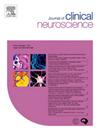Mannitol vs placebo for brain relaxation in cerebellopontine angle tumor surgeries: A randomized controlled trial
IF 1.9
4区 医学
Q3 CLINICAL NEUROLOGY
引用次数: 0
Abstract
Objective
Mannitol is widely used for intraoperative brain relaxation, but its benefit in posterior fossa lesions is still debatable. Hence, we aimed to compare mannitol with placebo for brain relaxation score (BRS) in cerebellopontine angle (CPA) tumor surgeries in the supine position and assess secondary outcomes including serum electrolytes, osmolality, hemodynamic parameters, complications, and postoperative acute kidney injury (AKI) and hospital stay.
Methods
This single-center, double-blind, randomized controlled trial was initiated after institute review board approval and Clinical Trial registration. Patients undergoing CPA tumor resection in the supine position were randomly assigned to mannitol (Group-M, received 1 g/kg of mannitol) or placebo group (Group-P, received 0.9 % saline). BRS was assessed after dura opening, and serum electrolytes and osmolarity were measured at baseline and postoperatively.
Results
Sixty-three patients were analyzed, 33 in group-M and 30 in group-P. The BRS was comparable between group-M [2 (1.5–3)] and group-P [2 (2–3)], P = 0.721. Intraoperatively, serum sodium was significantly lower [139.7 (3.5) vs. 142 (3.6), P = 0.011], serum potassium was higher [3.8 (0.6) vs. 3.4 (0.43), P = 0.003], systolic blood pressure was lower [114 (9.9) vs. 121 (9.7), P = 0.007], and urine output was higher [1162 (488.6) vs. 737 (395.9), P < 0.001] in group-M compared to group-P, respectively.
Conclusion
Brain relaxation during posterior fossa surgery is essential for optimizing surgical access and reducing complications. The current study suggests that mannitol may not significantly provide brain relaxation in patients undergoing CPA tumor resection in the supine position. However, further research is needed to establish definitive conclusions regarding its use in posterior fossa surgeries.
求助全文
约1分钟内获得全文
求助全文
来源期刊

Journal of Clinical Neuroscience
医学-临床神经学
CiteScore
4.50
自引率
0.00%
发文量
402
审稿时长
40 days
期刊介绍:
This International journal, Journal of Clinical Neuroscience, publishes articles on clinical neurosurgery and neurology and the related neurosciences such as neuro-pathology, neuro-radiology, neuro-ophthalmology and neuro-physiology.
The journal has a broad International perspective, and emphasises the advances occurring in Asia, the Pacific Rim region, Europe and North America. The Journal acts as a focus for publication of major clinical and laboratory research, as well as publishing solicited manuscripts on specific subjects from experts, case reports and other information of interest to clinicians working in the clinical neurosciences.
 求助内容:
求助内容: 应助结果提醒方式:
应助结果提醒方式:


